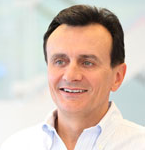 |
| AstraZeneca CEO Pascal Soriot |
AstraZeneca ($AZN) CEO Pascal Soriot has made emerging markets part of his 5-point campaign to rebuild the drugmaker's financial health. And now he is taking that piece of his campaign to North Africa, where AstraZeneca is part of a joint venture to build a $125 million plant.
The drugmaker confirmed Thursday to FiercePharma that it has formed AstraZeneca al-Djazair, with two companies in Algeria, Salhi and Hasnaoui, to build the facility. As prescribed by Algerian law, the local companies will have majority ownership while AstraZeneca will have a 49% interest, invest the $125 million to build the facility, will be in charge of the technological transfer, and manage the project and the facility once it is built.
Sofia Ylén with AstraZeneca global relations said while the location has not be finally determined, it is expected the facility would be built in the capital, Algiers. Construction is expected to begin in the fall and be completed in the first half of 2017. She said it is projected to have 104 employees and when ramped up be able to turn out 300 million tablets a year. The facility will make cardio, cancer, gastroenterology and diabetes drugs. Diabetes is another of AstraZeneca's 5 growth platforms, which also includes boosting sales of clot-buster Brilinta, respiratory treatments and expansion in Japan.
Emerging markets are already important to the U.K. drugmaker, accounting for more than 22% of its sales last year and growing by 12% to $5.8 billion. North Africa has been drawing more attention from Western drugmakers scouring the world for markets where they can reap faster growth than in the larger, but slower growing markets in the west. AstraZeneca has been in the country since 2007 and has about 180 employees there.
Algeria is a particularly good bet because it is one of the few countries in the region that offers universal healthcare. Other Big Pharma players have already realized the opportunities there, like France's Sanofi ($SNY), which is building its third plant in the French-speaking nation.
Soriot has promised the company can hit $45 billion in revenues by 2023, double the number from last year. But the drugmaker is having to work extra hard as generics erode revenues of its blockbuster Nexium. Sales of the acid reflux drug were down 31% in the first quarter, one of the main reasons the drugmaker reported revenues down 6% for Q1.
But the CEO is pushing all of the growth buttons hard. The FDA in April fast-tracked a proposed new use for Brilinta to reduce cardiovascular risks in patients for up to three years after a heart attack. If approved, it would go a long way toward the clot buster achieving the $3 billion in peak sales AstraZeneca has said it should reach, a number some analysts have smiled at.
But not everything is following the blueprint that the CEO has drawn up. Earlier this week he tongue-lashed regulators in the company's home country for failing to approve the drugmaker's first-in-class ovarian cancer drug Olaparib, sold as Lynparza in the U.S. and a product that AstraZeneca has projected to hit $2 billion in peak sales. After both England's Cancer Drugs Fund and drug-cost watchdog NICE deemed the treatment too expensive, Soriot complained that the country could not proclaim to aspire to be a life-sciences innovation center and then turn its back on paying for an innovative drug like Olaparib.
- here's the release